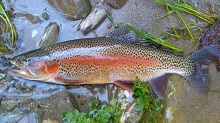Chemicals Causing Problems in Fish (Are Humans Next?)
Canadian Angling.com (December 14, 2010) — Recently two separate studies, one in England and another in Cyprus, have raised a major concern about our rivers and lakes. The concern is what the effects that man made chemicals are having on the ecosystems that we live in and subsequently their effect on humans. We will first look at the recent research by the Universities of Exeter and Brunel on endocrine disrupting chemicals (EDC’s). The universities have recently completed a 4 year study that shows that these chemicals are changing the sex of the fish. This is the first direct evidence that these “gender bending” chemicals are effecting the reproduction cycle of fish in UK Rivers.
Research has found that these chemicals are finding their ways from human products and into the rivers and oceans. The universities of Exeter and Brunel studied endocrine disrupting chemicals. If you didn’t know what these chemicals are, they are man made chemicals that interfere with the synthesis, secretion, transport, binding, action, or elimination of natural hormones in the body that are responsible for the maintenance of homeostasis (normal cell metabolism), reproduction, development, and/or behavior. They disrupt the ways that hormones work in the bodies of vertebrates (animals with backbones), including humans. These chemicals come from a variety of sources, the key one’s being female contraceptive drugs, and hormone replacement therapy pills. The most studied are the chemicals that are similar to female hormones. These chemicals have been slowly seeping into our rivers from sewage plants for decades and altering the male fish.
In the past, there was no scientific proof that theses chemicals were effecting the fish in the wild. The universities completed two studies on how these chemicals are effecting the sex and reproduction of the fish. One key finding was that these chemicals reduced the fish’s reproductive performance by 76%.
The study was led by Charles Tyler (Biosciences -University of Exeter with Professor) and John Sumpter (Institute of Environment at Brunel University)
Prof Tyler said: “This is the first time we’ve seen firm evidence that the intersex fish, males that have been feminised by EDCs, have a reduced ability to breed.
“Clearly this raises concerns about the implications on the future for wild fish populations living in UK rivers, but there’s also much wider issues raised by these findings. Some of the effects seen in fish could occur in other animals too as hormone systems are quite similar across all vertebrates.
“EDCs have been tentatively linked with human health impacts too, including, falling sperm counts and cardio-vascular disease. These findings remain more controversial,” Prof Tyler added. “In contrast, we have shown, unequivocally that environmental oestrogens alter sexual development in fish and now, through this study, that this can impact on their ability to breed.”
Fish absorb high amounts of EDC’s than humans would because they absorb nutrients through the water. Many environmentalists are concerned over the findings because this is one key component of the food chain and an early warning system. One important thing to note is that a fish’s sex is not decided until after their birth and they are more reactive to the chemicals in their environment.
Prof Tyler concluded: “Fish still share many biological links with humans and the fact that their reproduction has the potential to be affected by EDCs is certainly a cause for concern. From a risk assessment point of view, these results are very significant.”
At the same time, researchers in Cyprus have discovered trace levels of pharmaceuticals in their water supply. While only finding trace amounts of painkillers, antibiotics and antidepressants, the scientists realize that further studies are required to determine the long term effect these chemicals are having in the environment.
“Society needs to pay more attention to water quality issues because it is generally taken for granted,” said Dr Konstantinos Makris, (Assistant Professor at the Cyprus International Institute for Environmental and Public Health, part of the Cyprus University of Technology).
The scary thing is that they found 16 pharmaceuticals, six known or suspected endocrine disrupting compounds, two flame retardants, a fragrance and an insect repellent that were found in the water.
Dr. Markris said that “We found almost all of them in treated waste water, there were less in the ground water and we found two in home tap supplies. We had thought the waste water treatment process would have been effective enough to remove the majority of these compounds.” Greece is the top antibiotic consumer of the European Surveillance of Antimicrobial Consumption (EASC) project and Cyprus is second.
“It is not actually a Cypriot problem, it’s a global problem particularly in the developed world where people consume vast quantities of pharmaceuticals, most of the time for no important reason,” said Makris. It was very interesting that researchers also found very small amounts of ibuprofen, in household tap water, along with Bisphenol-A (BPA), which can be used in the production of plastics. They also found Bisphenol-A, a suspected endocrine disruptor (EDC’s), in the tap water.
It is also important to note that last week the European Union banned in plastic baby bottles starting in 2011. The levels that they found are extremely low, however there needs to be an upgrade on how we treat waste products and water treatment plants to eliminate these chemicals from ever getting into the rivers and lakes.
“Conventional treatment is not designed to remove these emerging contaminants, so its obvious that other technologies are needed,” Dr. Makris said.
Wayne Sheridan



